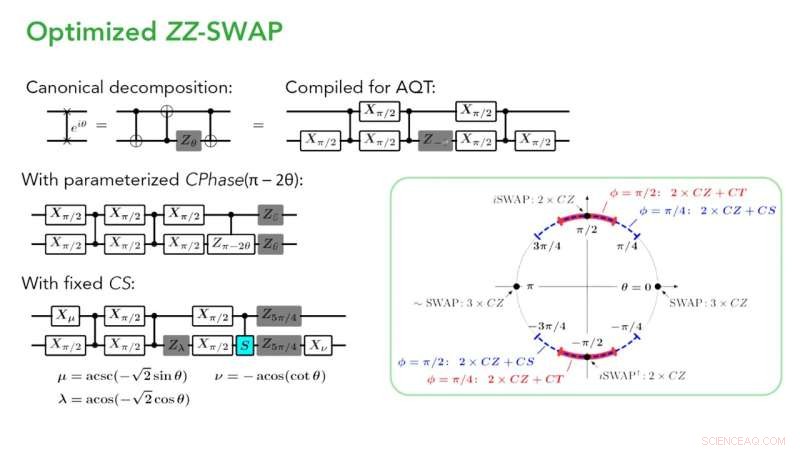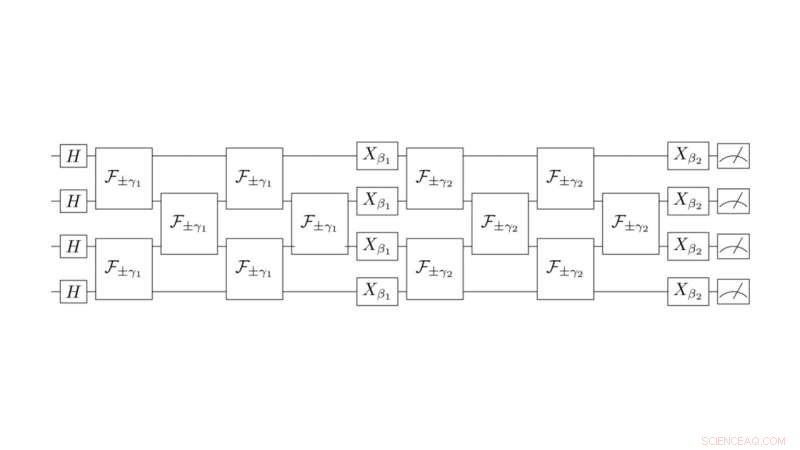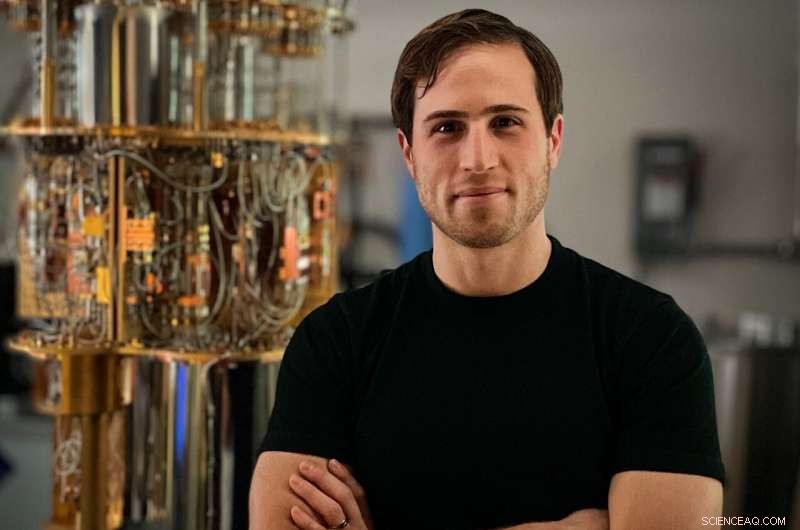
Schema completo delle reti SWAP ottimizzate per software per i cancelli di AQT. Credito:Rich Rines/Super.tech
Una partnership di ricerca presso l'Advanced Quantum Testbed (AQT) presso il Lawrence Berkeley National Laboratory (Berkeley Lab) e Super.tech con sede a Chicago (acquisita da ColdQuanta nel maggio 2022) ha dimostrato come ottimizzare l'esecuzione del protocollo di rete ZZ SWAP, importante per calcolo quantistico. Il team ha anche introdotto una nuova tecnica per la mitigazione degli errori quantistici che migliorerà l'implementazione del protocollo di rete nei processori quantistici. I dati sperimentali sono stati pubblicati lo scorso luglio in Physical Review Research , aggiungendo più percorsi a breve termine per implementare algoritmi quantistici utilizzando il calcolo quantistico basato su gate.
Un compilatore intelligente per hardware quantistico superconduttore
I processori quantistici con architetture bidimensionali o tridimensionali hanno una connettività qubit limitata in cui ogni qubit interagisce solo con un numero limitato di altri qubit. Inoltre, le informazioni di ogni qubit possono esistere solo per così tanto tempo prima che il rumore e gli errori causino la decoerenza, limitando il tempo di esecuzione e la fedeltà degli algoritmi quantistici. Pertanto, durante la progettazione e l'esecuzione di un circuito quantistico, i ricercatori devono ottimizzare la traduzione del circuito costituito da porte (logiche) astratte in istruzioni fisiche basate sulle porte hardware native disponibili in un determinato processore quantistico. Efficienti decomposizioni dei circuiti riducono al minimo il tempo di funzionamento perché considerano il numero di porte e operazioni supportate nativamente dall'hardware per eseguire le operazioni logiche desiderate.
Le porte SWAP, che scambiano informazioni tra qubit, sono spesso introdotte nei circuiti quantistici per facilitare le interazioni tra le informazioni in qubit non adiacenti. Se un dispositivo quantistico consente solo porte tra qubit adiacenti, gli scambi vengono utilizzati per spostare le informazioni da un qubit a un altro qubit non adiacente.
In hardware quantistico rumoroso su scala intermedia (NISQ), l'introduzione di porte di scambio può richiedere un grande sovraccarico sperimentale. La porta di scambio deve spesso essere scomposta in porte native, come le porte NON controllate. Pertanto, quando si progettano circuiti quantistici con connettività qubit limitata, è importante utilizzare un compilatore intelligente in grado di cercare, scomporre e annullare porte quantistiche ridondanti per migliorare il runtime di un algoritmo o applicazione quantistica.

Schema delle reti SWAP per QAOA su quattro qubit. Credito:Akel Hashim/Berkeley Lab
La partnership di ricerca ha utilizzato il software SuperstaQ di Super.tech, consentendo agli scienziati di personalizzare con precisione le loro applicazioni e automatizzare le compilazioni di circuiti per l'hardware superconduttore di AQT, in particolare per una porta S nativa controllata ad alta fedeltà, che non è disponibile sulla maggior parte dei sistemi hardware. Questo approccio di compilazione intelligente con quattro qubit transmon consente di scomporre le reti SWAP in modo più efficiente rispetto ai metodi di decomposizione standard.
A network of ZZ SWAP gates requires only minimal linear connectivity between qubits without additional couplings, so it offers practical advantages for the efficient execution of quantum algorithms such as the Quantum Approximate Optimization Algorithm (QAOA). QAOA approximates solutions to combinatorial optimization problems—finding the optimal answer by giving a set of criteria. The Maximum-Cut problem, which can be used to arrange hubs on a transport grid system, is an example of a famous combinatorial optimization problem that can be potentially solved faster with QAOA using quantum circuits.
"One of the toughest challenges in quantum computing is to perform discrete logic operations. Because our control signals are analog and continuous, they're always imperfect. As we build more complex quantum circuits, the software infrastructure that optimally compiles gates tailored for AQT's hardware helps us achieve higher operational fidelity," Akel Hashim, the lead AQT researcher on the experiment and a graduate student at the University of California, Berkeley.
"A unique feature of quantum computing is that it enables partial logic gates. This feature has no parallel in traditional boolean logic—for example, your laptop computer can't execute 50% of an AND gate. AQT's ability to calibrate these partial controlled-S quantum gates opened the door for us to develop a wider array of novel optimizations to squeeze the most out of the hardware," said Rich Rines, formerly of Super.tech and currently a software engineer at ColdQuanta.
"A key software engineering challenge for this experiment was collaborating remotely, so we iteratively developed quantum circuit optimizations informed by the custom gates AQT's team calibrated. We optimized end-to-end by figuring out how to serialize these pulses while considering the hardware. We also figured out how to integrate open-source quantum software packages with our compiler, ensuring that our optimizations don't re-invent the wheel," said Victory Omole, formerly at Super.tech and software engineer at ColdQuanta.

Akel Hashim, lead AQT researcher on the experiment. Credit:Akel Hashim/Berkeley Lab
As part of the experiment, the team also introduced a novel technique called Equivalent Circuit Averaging (ECA), which randomized the various parameters of the SWAP networks to generate many logically equivalent circuits. ECA randomizes the decomposition of quantum circuits, mitigating the impact of systematic coherent errors—one of the most severe errors in quantum computers and error mitigation at AQT.
"I proposed a way to merge my previous experimental work in randomized compiling with Quantum Benchmark (acquired by Keysight) using Super.tech's smart compiler to study a new way to reduce the impact of crosstalk errors," said Hashim. "I would not have had the insight to come up with this idea had I not worked with other researchers as part of AQT's user program. As someone who's going to enter the workforce, networking is critical to building a core base of people I know in the field who are experts in various areas, to whom I can pitch research ideas as well."
These experimental optimizations resulted in an improvement of up to 88% in the performance accuracy of QAOA. Researchers are looking to continue to explore and refine the methods in this work and apply them to other applications.
Supporting industry growth with an open-access research lab
AQT operates a state-of-the-art open experimental testbed based on superconducting circuits and is funded by the United States Department of Energy Office of Science Advanced Scientific Computing Research (ASCR) program. Technologies developed elsewhere can be deployed and field-tested at AQT, providing deep access to the full quantum computing stack at no additional cost.
Since the inauguration of its user program in 2020, AQT provided Super.tech, one of several industry users, with low-level access to the hardware to test their ideas. Few cloud-based quantum platforms offer this type of full access to the entire quantum computing stack and real-time feedback from the hardware experts at no cost. Super.tech collaborated with AQT's expert experimental team to learn ways to improve performance on this type of hardware.
"By revealing the inner controls of quantum hardware, AQT's collaborative approach with users drives innovation throughout the quantum computing stack. We look forward to continuing our research collaboration with AQT, and we will continue to share these results with the scientific community by publishing our learnings," said Pranav Gokhale, VP of Quantum Software at ColdQuanta and Super.tech former CEO and co-founder.
AQT at Berkeley Lab continues to grow as a cutting-edge hub for quantum information research and development by bringing together expertise and users, including early-stage startups, such as Super.tech, who now continue in their growth journey as part of ColdQuanta. + Esplora ulteriormente